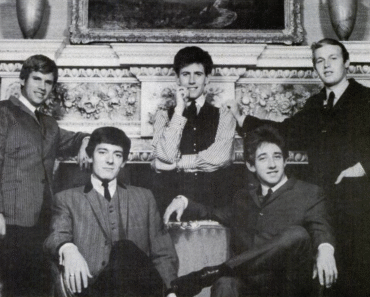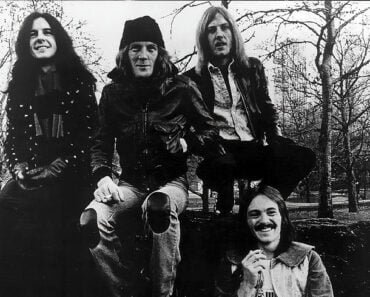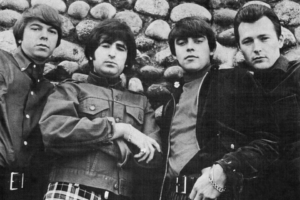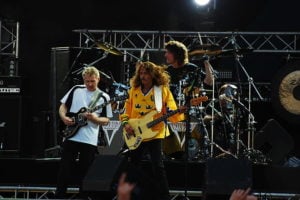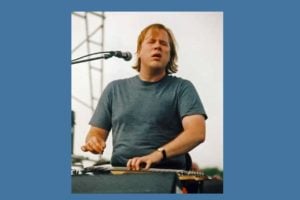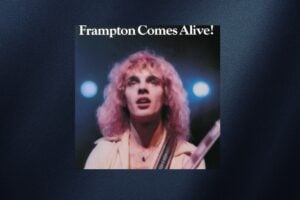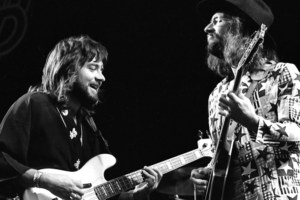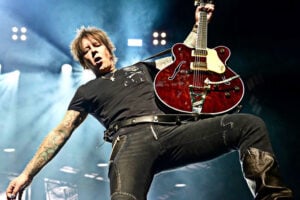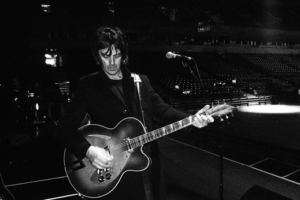
Feature Photo: Bruce Alan Bennett / Shutterstock.com
The Faces emerged from the ashes of two significant British rock acts in 1969, creating one of the most beloved and influential rock bands of the early 1970s. When Small Faces frontman Steve Marriott abruptly quit the band on New Year’s Eve 1968 to form Humble Pie, the remaining members—bassist Ronnie Lane, drummer Kenney Jones, and keyboardist Ian McLagan—found themselves at a crossroads. Rather than disbanding, they recruited vocalist Rod Stewart and guitarist Ronnie Wood, both recently departed from the Jeff Beck Group, to form a new lineup. With the addition of these two taller members (both around 5’9″), the “Small” was dropped from the band’s name, and the Faces were born. Their unique arrangement was complicated from the start, as Stewart had also recently signed a solo recording contract with Mercury Records while the band was signed to Warner Bros., creating a dual career path that would eventually contribute to the group’s demise. Despite this inherent tension, the Faces developed a reputation as one of rock’s most exciting live acts, known for their boozy, good-time performances and musical chemistry that transcended their frequently intoxicated state.
During their relatively brief existence from 1969 to 1975, the Faces released four studio albums: “First Step” (1970), “Long Player” (1971), “A Nod Is As Good As a Wink… to a Blind Horse” (1971), and “Ooh La La” (1973). Their musical style combined elements of rock, folk, blues, and soul with a distinctly British sensibility and working-class attitude that set them apart from their contemporaries. While their first two albums achieved moderate success, it was their third effort, “A Nod Is As Good As a Wink,” that brought them mainstream recognition, bolstered by the success of their hit single “Stay with Me” and coinciding with Stewart’s solo breakthrough with “Maggie May.” Throughout their career, the Faces battled the perception that they were merely Stewart’s backing band, a tension that grew as his solo career flourished. This situation came to a head during the recording of “Ooh La La,” which Stewart publicly criticized, leading to Ronnie Lane’s departure in 1973. The band continued with Japanese bassist Tetsu Yamauchi until 1975, releasing a live album “Coast to Coast: Overture and Beginners,” but the writing was on the wall as Wood began working with the Rolling Stones and Stewart’s solo stardom continued to ascend.
Despite their relatively brief tenure, the Faces left an indelible mark on rock music, influencing countless bands with their loose, freewheeling approach and unpretentious attitude. After disbanding, the members went on to varied careers: Stewart became a global superstar, Wood joined the Rolling Stones as a permanent member, Jones later replaced Keith Moon in The Who, and McLagan established himself as an in-demand session musician. Lane’s post-Faces career was cut tragically short by multiple sclerosis, which eventually forced his retirement from music. Various partial reunions occurred over the decades, including performances at the 1986 and 1993 BRIT Awards, and a more substantial reunion tour in 2010-2011 with Mick Hucknall of Simply Red handling vocal duties. In 2012, the Faces and Small Faces were jointly inducted into the Rock and Roll Hall of Fame, cementing their legacy as one of rock’s most beloved bands. More recently, the surviving members—Stewart, Wood, and Jones—have reportedly been working on new material, with plans for the first new Faces album in over 50 years.
Rod Stewart
Rod Stewart, born Roderick David Stewart on January 10, 1945, in London, England, joined the Faces in 1969 after departing the Jeff Beck Group alongside guitarist Ronnie Wood. As the Faces’ charismatic lead vocalist, Stewart brought his distinctive raspy voice and magnetic stage presence to the band, helping to define their sound and image. His powerful, soulful vocals were equally adept at delivering raucous rockers like “Stay with Me” and more tender ballads. While Stewart was undoubtedly the band’s primary frontman, he wasn’t their only vocalist; Ronnie Lane also sang lead on several tracks, particularly his own compositions, creating a vocal dynamic that added depth to the Faces’ repertoire.
Stewart’s tenure with the Faces was complicated by his simultaneous solo career, which began with his debut album “An Old Raincoat Won’t Ever Let You Down” in 1969. The dual career paths initially coexisted without significant issues, as his early solo records featured the Faces members as his backing band on many tracks. However, when Stewart’s third solo album “Every Picture Tells a Story” (1971) topped the charts in both the US and UK, bolstered by the massive success of “Maggie May,” the balance of power inevitably shifted. While the Faces benefited from Stewart’s newfound fame in the short term, with their album “A Nod Is As Good As a Wink” becoming their biggest commercial success, his increasing solo commitments and the public perception of the Faces as his backing band created tensions within the group. These tensions came to a head during the recording of “Ooh La La” (1973), which Stewart publicly criticized after its release, calling it a “bloody mess” in a Melody Maker interview, leading to Ronnie Lane’s departure from the band.
Despite the internal conflicts, Stewart continued with the Faces until the band’s dissolution in 1975, by which time he had already firmly established himself as one of rock’s biggest solo stars. After the Faces, Stewart’s career soared to even greater heights, particularly with the release of “Atlantic Crossing” (1975), which marked his move to Los Angeles and a shift toward a more polished sound. Over the subsequent decades, Stewart maintained his position as one of rock’s most successful artists, selling more than 120 million records worldwide and reinventing himself multiple times while retaining his distinctive vocal style. Though he has occasionally reunited with his former Faces bandmates for special performances, including the 1986 and 1993 BRIT Awards shows, Stewart’s priority has remained his solo career. In recent years, he has expressed interest in a more substantial Faces reunion, including work on a potential new album with Wood and Jones, demonstrating that his connection to the band remains meaningful despite the many years that have passed since their heyday.
Ronnie Wood
Ronnie Wood, born June 1, 1947, in Hillingdon, England, joined the Faces in 1969 alongside Rod Stewart, both having recently departed the Jeff Beck Group. As the Faces’ lead guitarist, Wood brought a raw, blues-based playing style that perfectly complemented the band’s loose, energetic approach. Beyond his guitar work, Wood was also a significant songwriter for the group, co-writing many of their most notable songs, including “Stay with Me” (with Stewart) and “Ooh La La” (with Ronnie Lane). He occasionally took on vocal duties as well, most notably on the title track of “Ooh La La,” which became one of the band’s most enduring songs despite not being released as a single during their active years.
Wood’s role in the Faces extended beyond just playing guitar; he formed a tight musical partnership with bassist Ronnie Lane, the two often referred to collectively as “the Ronnies.” Together, they contributed significantly to the band’s musical direction and songwriting. While Stewart’s solo career was flourishing, Wood also pursued projects outside the Faces, releasing his first solo album “I’ve Got My Own Album to Do” in 1974, which featured guest appearances from several of his Faces bandmates as well as friends like George Harrison and Keith Richards. In 1975, Wood began playing with the Rolling Stones, initially as a temporary replacement for Mick Taylor, a situation that further complicated the Faces’ already fragile existence. This dual commitment, along with Stewart’s increasing focus on his solo career, contributed to the Faces’ breakup later that year.
Following the Faces’ dissolution, Wood officially joined the Rolling Stones as a permanent member in 1976, beginning what would become a decades-long association that continues to this day. His distinctive guitar style and musical versatility made him a perfect fit for the Stones, where he formed a legendary guitar tandem with Keith Richards. Beyond his work with the Stones, Wood has maintained a parallel career as a solo artist and collaborator with numerous other musicians. He’s also established himself as a respected visual artist, with his paintings and drawings exhibited in galleries worldwide. Over the years, Wood has participated in various Faces reunions, including the 2010-2011 tour with Mick Hucknall on vocals, and has expressed enthusiasm for a potential new Faces album with Stewart and Jones. Despite his long-standing role as a Rolling Stone, Wood has always acknowledged the importance of the Faces in his career and maintained affection for the music they created together during their brief but impactful existence.
Ronnie Lane
Ronnie Lane, born April 1, 1946, in London, England, was a founding member of both the Small Faces and the Faces, providing a crucial link between the two bands. As the Faces’ bassist and secondary vocalist, Lane brought a distinctive musical sensibility that balanced Stewart and Wood’s more raucous tendencies with a folkier, more introspective approach. His songwriting contributions to the Faces, including tracks like “Debris,” “Ooh La La” (co-written with Wood), and “Flags and Banners,” showcased his gift for melancholy, reflective material that added depth and variety to the band’s repertoire. Lane’s warm, unpretentious vocals on his compositions provided a perfect counterpoint to Stewart’s more flamboyant style, creating a musical dynamic that was central to the Faces’ appeal.
Despite being a founding member, Lane’s role in the Faces diminished as Stewart’s solo career flourished, creating tensions that ultimately led to his departure in 1973. The recording of “Ooh La La” marked both Lane’s greatest influence on the band’s sound—the album is often referred to as “Ronnie Lane’s album” due to his increased songwriting contributions—and the breaking point in his relationship with the group. Stewart’s public criticism of the album after its release, coupled with Lane’s frustration over his diminished role as the band increasingly became perceived as Stewart’s backing group, prompted his exit. Within months of leaving the Faces, Lane formed a new band called Slim Chance, pursuing a more folk-influenced sound that reflected his personal musical vision, and scored an immediate UK hit with “How Come?” However, financial difficulties followed when a self-organized tour using a traveling circus format, known as “The Passing Show,” ended in financial disaster.
Following his departure from the Faces, Lane released several critically acclaimed but commercially unsuccessful albums with Slim Chance, including “Anymore for Anymore” (1974), “Ronnie Lane’s Slim Chance” (1975), and “One for the Road” (1976). In 1977, he collaborated with Pete Townshend of The Who on the album “Rough Mix,” which is widely regarded as one of his finest post-Faces achievements. Tragically, Lane was diagnosed with multiple sclerosis in the late 1970s, a condition that progressively limited his ability to perform and eventually forced his retirement from music in the early 1990s. He moved to Texas in the early 1980s, where benefit concerts were organized to help with his medical expenses, bringing together many of his famous friends and admirers. Lane made one of his final concert appearances in 1992 at a Ronnie Wood show, with Ian McLagan on keyboards. He died on June 4, 1997, at the age of 51, leaving behind a legacy as one of British rock’s most soulful songwriters and an irreplaceable element of the Faces’ unique chemistry.
Ian McLagan
Ian McLagan, born May 12, 1945, in Hounslow, England, was the keyboardist for both the Small Faces and the Faces, providing musical continuity between the two bands. After joining the Small Faces in 1966 as a replacement for Jimmy Winston, McLagan’s Hammond organ and piano work became an integral part of their sound. When the Small Faces transitioned into the Faces in 1969, following Steve Marriott’s departure, McLagan’s keyboard playing evolved to complement the new lineup’s more expansive, blues-rock approach. Throughout the Faces’ existence, his distinctive organ and piano contributions added depth and texture to their sound, whether providing rollicking accompaniment to up-tempo rockers or more nuanced support for ballads.
Beyond his instrumental contributions, McLagan was a vital part of the Faces’ chemistry and spirit. His keyboard skills helped bridge the stylistic gap between the more pop-oriented Small Faces and the rootsier direction of the Faces. While not as prominent a songwriter as Lane, Stewart, or Wood, McLagan nonetheless made significant contributions to the band’s compositions and arrangements. He remained with the Faces until their dissolution in 1975, participating in all four of their studio albums. After the band’s breakup, McLagan embarked on a successful career as a highly sought-after session and touring musician, working with numerous artists including the Rolling Stones, Bob Dylan, Bonnie Raitt, and Bruce Springsteen. He formed his own group, Ian McLagan & the Bump Band, and released several solo albums showcasing his keyboard prowess and songwriting abilities.
McLagan remained an advocate for the Faces’ legacy throughout his life, participating in various reunions and keeping the flame alive through his music and writings. In 1998, he published his autobiography, “All the Rage,” which provided valuable insight into his time with both the Small Faces and the Faces. In 2009, when the Faces reunited for charity performances at London’s Royal Albert Hall without Rod Stewart, McLagan was a central figure in the reformed lineup. He continued performing and recording until his untimely death on December 3, 2014, at the age of 69, from a stroke suffered at his home in Austin, Texas. His passing was deeply mourned by fans and fellow musicians alike, who recognized his immense contribution to British rock music. McLagan’s keyboard playing remains a defining element of the Faces’ sound, and his dedication to preserving and celebrating the band’s music helped ensure their enduring legacy.
Kenney Jones
Kenney Jones, born September 16, 1948, in London, England, was the drummer for both the Small Faces and the Faces, providing rhythmic continuity between the two bands. As a founding member of the Small Faces in 1965, Jones established himself as a skilled, versatile drummer whose playing evolved from the mod-influenced pop of their early years to the more psychedelic and experimental sounds of later recordings like “Ogdens’ Nut Gone Flake.” When the Small Faces became the Faces in 1969, Jones adapted his drumming style to suit the new lineup’s more blues-based, loose approach, while maintaining the solid rhythmic foundation that anchored their often freewheeling performances. Throughout the Faces’ existence, his precise yet swinging style was crucial to their sound, providing the perfect backdrop for Stewart’s vocals, Wood’s guitar work, Lane’s bass playing, and McLagan’s keyboards.
Jones remained with the Faces until their breakup in 1975, contributing to all four of their studio albums and their live recordings. Unlike some of his bandmates, he did not pursue a parallel solo career during the Faces’ existence, focusing instead on his role within the group. After the Faces dissolved, Jones participated in a reunion of the Small Faces in the late 1970s, joining Steve Marriott and Ian McLagan (with Rick Wills replacing Ronnie Lane, who was already battling multiple sclerosis). In 1978, following the death of Keith Moon, Jones was invited to join The Who, a testament to his respected status among his peers. His tenure with The Who lasted until the mid-1980s, during which time he recorded the albums “Face Dances” (1981) and “It’s Hard” (1982) and participated in several tours.
Throughout the years following the Faces’ breakup, Jones has remained active in music while also pursuing other interests, including polo and various business ventures. He has participated in various Faces reunions, including the 2010-2011 tour with Mick Hucknall on vocals, maintaining his connection to the band’s legacy. In more recent years, Jones has expressed enthusiasm for a more comprehensive Faces reunion with Stewart and Wood, including the possibility of recording new material. His drumming style, characterized by its combination of power, precision, and swing, was a defining element of the Faces’ sound, providing the solid rhythmic foundation that allowed the other band members to explore and improvise. As one of the three members who bridged the Small Faces and the Faces, Jones played a crucial role in shaping the musical identity of both bands, cementing his place as one of British rock’s most respected drummers.
Tetsu Yamauchi
Tetsu Yamauchi, born October 21, 1947, in Fukuoka, Japan, joined the Faces in 1973 as a replacement for founding bassist Ronnie Lane, who had departed the band due to frustrations over his diminishing role and Stewart’s increasing solo success. Prior to joining the Faces, Yamauchi had established himself in the British rock scene as a member of Free, replacing Andy Fraser in that band’s final lineup. His recruitment to the Faces marked a significant shift in the band’s dynamic; not only was he replacing a founding member whose songwriting and vocals had been integral to their sound, but as a non-English speaker who reportedly enjoyed drinking even more than his notoriously boozy bandmates, he brought a different energy to the group during their final phase.
Yamauchi’s tenure with the Faces was relatively brief, spanning from his joining in 1973 until the band’s dissolution in 1975. During this period, the Faces did not record a new studio album, though they did release the live record “Coast to Coast: Overture and Beginners” in 1974, credited as “Rod Stewart/Faces.” Yamauchi’s bass playing can be heard on this album, as well as on the band’s final single, “You Can Make Me Dance, Sing or Anything,” released in 1974. By this time, the Faces were already in decline, with Wood beginning to work with the Rolling Stones and Stewart’s solo career continuing to flourish. Yamauchi’s integration into the band was further complicated by the language barrier and the fact that he was replacing a beloved founding member whose distinctive musical voice had been central to the Faces’ identity.
Following the Faces’ breakup in 1975, Yamauchi returned to his native Japan, where he continued his musical career as a jazz musician, recording and touring in his home country. Unlike his former bandmates, who maintained high profiles in the international music scene, Yamauchi largely disappeared from the Western music world, making his contribution to the Faces’ story something of a footnote in the band’s history. Nevertheless, his role in the final chapter of the Faces is noteworthy, as he helped the band fulfill their remaining contractual obligations and touring commitments during a challenging period when their future was increasingly uncertain. While his impact on the Faces’ legacy is not as substantial as the original members, Yamauchi’s participation represents an interesting transitional phase in the band’s brief but influential existence, highlighting both their international appeal and the challenges they faced in maintaining cohesion as individual members pursued other opportunities.
Musical Legacy and Influence
The Faces’ musical legacy extends far beyond the relatively brief period of their active existence from 1969 to 1975. Their four studio albums showcased a distinctive blend of rock, blues, folk, and soul that struck a chord with audiences and musicians alike. What set the Faces apart from many of their contemporaries was their unpretentious approach and the palpable sense of fun and camaraderie that permeated their music, particularly in their live performances. They were known for their boozy, good-time image, yet beneath the revelry was serious musical talent and a genuine emotional depth, particularly in Ronnie Lane’s more reflective compositions. This combination of party-ready rock and soulful introspection created a unique musical identity that continued to resonate long after the band’s dissolution.
The influence of the Faces can be heard in numerous bands that followed in their wake. Their loose, freewheeling style and working-class sensibility prefigured aspects of punk rock, while their rootsy, blues-based approach influenced generations of rock bands from The Replacements and The Black Crowes to more recent acts. Even Sex Pistols members Steve Jones and Glen Matlock were avowed Faces fans, demonstrating the band’s cross-generational appeal and unexpected influence on punk. Beyond their musical impact, the Faces’ unpretentious attitude and emphasis on live performance as a communal celebration established a template for rock bands that valued authenticity and connection with their audience over technical perfection or artistic pretension.
The individual members’ post-Faces careers further extended their collective influence. Stewart’s solo success brought elements of the Faces’ sound to a global audience, while Wood’s long tenure with the Rolling Stones allowed aspects of his Faces-era playing style to infuse one of rock’s most iconic bands. Jones’ drumming with The Who maintained the high-profile presence of the Faces’ rhythmic approach, and McLagan’s extensive session work spread his keyboard style across numerous recordings. Lane’s post-Faces work with Slim Chance and his collaboration with Pete Townshend on “Rough Mix” preserved his unique songwriting voice despite his declining health. More recently, the band’s legacy has been celebrated through various reunion performances, comprehensive reissues of their catalog, and their 2012 induction into the Rock and Roll Hall of Fame alongside the Small Faces. Reports of new material being recorded by Stewart, Wood, and Jones suggest that the Faces’ story may yet have another chapter, more than five decades after their formation, testament to the enduring appeal of their music and the special chemistry they created together.
Check out more Faces articles on ClassicRockHistory.com Just click on any of the links below……
Complete List Of Faces Songs From A to Z
Top 10 Small Faces Songs
Stewart, Wood & Jones Working On New “Faces” Album
Read More: Artists’ Interviews Directory At ClassicRockHistory.com
Read More: Classic Rock Bands List And Directory




